
 |
||||||
|
GAY
FILM REVIEWS BY MICHAEL D. KLEMM
|
||||||
|
The
Wedding Banquet MGM
Home Video, Screenplay:
Starring:
Unrated, 106 minutes |
Going
To The Chapel
The conventional wisdom expressed by much of queer cinema study insists that only gay directors should direct gay films. This argument has merits but ignores a few notable exceptions, one of them being Taiwan-born filmmaker, Ang Lee - the director of Brokeback Mountain (1995). Lee is straight yet managed to craft one of the most moving queer films of all time. Somehow it has been forgotten that Lee had previously tested the waters of gay cinema more than a decade earlier. The year was 1993 and the film was The Wedding Banquet. It was Lee's second film and it is a stunner. |
|
It goes without saying
that the parents know nothing about Simon. Though he is sick of lying,
Wai-Tung thinks it would kill his parents for them to know the truth.
(What, no grandchildren?) So Wai-Tung goes on pretending and then Simon
has an idea. |
|
|
|
|
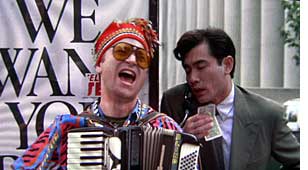 The
Wedding Banquet
is a thoroughly delightful film from beginning to end. It begins as a screwball
comedy. Mother's tape-recorded letters are a hoot; Wai-Tung is listening
to one while pumping iron in the gym during the film's opening credits.
Her pleadings become more and more desperate until finally she enrolls him
in a dating service and sends him a questionnaire. Wai-Tung and Simon have
a blast filling it out with the most impossible requirements they can think
of. His ideal woman would have two doctorates (one in physics), speak five
languages and sing opera. Simon's suggestion that she also be six feet tall
is overruled because, after all, she is Chinese and we can't be
too unrealistic. Imagine their shock when the service finds someone
who meets most of the requirements (she only has one phD), and mother
is flying her to New York to meet him. The
Wedding Banquet
is a thoroughly delightful film from beginning to end. It begins as a screwball
comedy. Mother's tape-recorded letters are a hoot; Wai-Tung is listening
to one while pumping iron in the gym during the film's opening credits.
Her pleadings become more and more desperate until finally she enrolls him
in a dating service and sends him a questionnaire. Wai-Tung and Simon have
a blast filling it out with the most impossible requirements they can think
of. His ideal woman would have two doctorates (one in physics), speak five
languages and sing opera. Simon's suggestion that she also be six feet tall
is overruled because, after all, she is Chinese and we can't be
too unrealistic. Imagine their shock when the service finds someone
who meets most of the requirements (she only has one phD), and mother
is flying her to New York to meet him. |
|
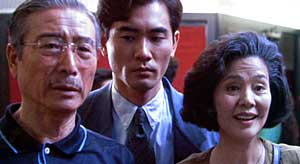 In
most films that would probably be the main plot but here it's only
the appetizer before the main course. There is much more madness to come.
The Wedding Banquet is often
hilarious, but Lee also knows when to hold back for emotional resonance
and so his film never explodes into flat out farce like, for example,
La Cage Aux Folles or its American hybrid, The
Birdcage. The humor arises from natural situations that aren't in the
least bit forced or contrived. In
most films that would probably be the main plot but here it's only
the appetizer before the main course. There is much more madness to come.
The Wedding Banquet is often
hilarious, but Lee also knows when to hold back for emotional resonance
and so his film never explodes into flat out farce like, for example,
La Cage Aux Folles or its American hybrid, The
Birdcage. The humor arises from natural situations that aren't in the
least bit forced or contrived. |
|
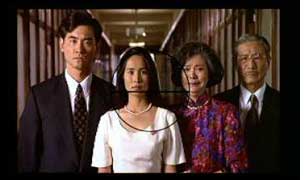 I'd
like to note that in 1993, when The Wedding
Banquet played in movie theaters, the "fraud marriage to
fool Immigration" storyline was unique and hadn't yet become the cliched
plot device that it has turned into today. (Recent examples include the
Sandra Bullock vehicle The Proposal, and TV's Desperate Housewives.)
This story was still fresh then, and the film manages to remain fresh even
today. I'd
like to note that in 1993, when The Wedding
Banquet played in movie theaters, the "fraud marriage to
fool Immigration" storyline was unique and hadn't yet become the cliched
plot device that it has turned into today. (Recent examples include the
Sandra Bullock vehicle The Proposal, and TV's Desperate Housewives.)
This story was still fresh then, and the film manages to remain fresh even
today. |
|
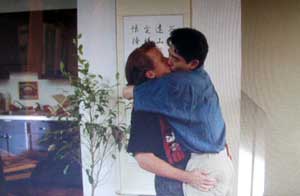 There
are many surprises that I don't want to spoil.
The Wedding Banquet is blessed with a fine script, excellent
character development and winning performances. Lee has a talent for establishing
character in the briefest of sketches. Wai-Tung and Simon are very believable
as a couple. We know immediately that Wai-Tung is a workaholic and Simon
is the typical put-upon wife. It is also apparent that these two guys are
deeply in love. At the time of its theatrical release, most straight filmmakers
were still too timid to show male intimacy (Philadelphia
anyone?) and that is not the case here. Even if there is no big
sex scene, Wai-Tung and Simon's relationship is not sanitized; they
kiss, show affection, and are frequently seen laying in bed together. There
is a terrific scene where they find a moment alone, because the parents
are out shopping, and their playful affection for each other is clear and
heartfelt. Even more refreshing, for its day, was the interracial element. There
are many surprises that I don't want to spoil.
The Wedding Banquet is blessed with a fine script, excellent
character development and winning performances. Lee has a talent for establishing
character in the briefest of sketches. Wai-Tung and Simon are very believable
as a couple. We know immediately that Wai-Tung is a workaholic and Simon
is the typical put-upon wife. It is also apparent that these two guys are
deeply in love. At the time of its theatrical release, most straight filmmakers
were still too timid to show male intimacy (Philadelphia
anyone?) and that is not the case here. Even if there is no big
sex scene, Wai-Tung and Simon's relationship is not sanitized; they
kiss, show affection, and are frequently seen laying in bed together. There
is a terrific scene where they find a moment alone, because the parents
are out shopping, and their playful affection for each other is clear and
heartfelt. Even more refreshing, for its day, was the interracial element. |
|
|
Viewers are in for a treat. The Wedding Banquet is a cultural feast with colorful traditions parading before the camera. Both languages are also spoken in the film to enhance this beautiful study in contrasts, both cultural and generational. Visually rich and beautifully acted, it satisfies on all levels. |
|
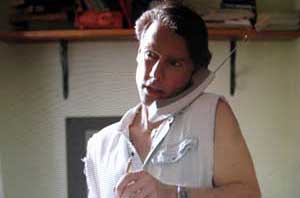 This
is one of those films when you really can say that you laughed and
you cried. I laughed as the three principals "de-gayed" Wai-Tung and Simon's
apartment. ACT-UP posters come down, a videotape of Todd Haynes' Poison
is put away, a framed picture of Wai-Tung naked and holding a hat in front
of his crotch is replaced by a military portrait - all to the strains of
frenzied Charles Mingus style jazz. Lee hits all the right comic notes and
then engages our emotions with some pretty intense, and poignant, third
act drama. This
is one of those films when you really can say that you laughed and
you cried. I laughed as the three principals "de-gayed" Wai-Tung and Simon's
apartment. ACT-UP posters come down, a videotape of Todd Haynes' Poison
is put away, a framed picture of Wai-Tung naked and holding a hat in front
of his crotch is replaced by a military portrait - all to the strains of
frenzied Charles Mingus style jazz. Lee hits all the right comic notes and
then engages our emotions with some pretty intense, and poignant, third
act drama. |
|
|
More
On Ang Lee: |